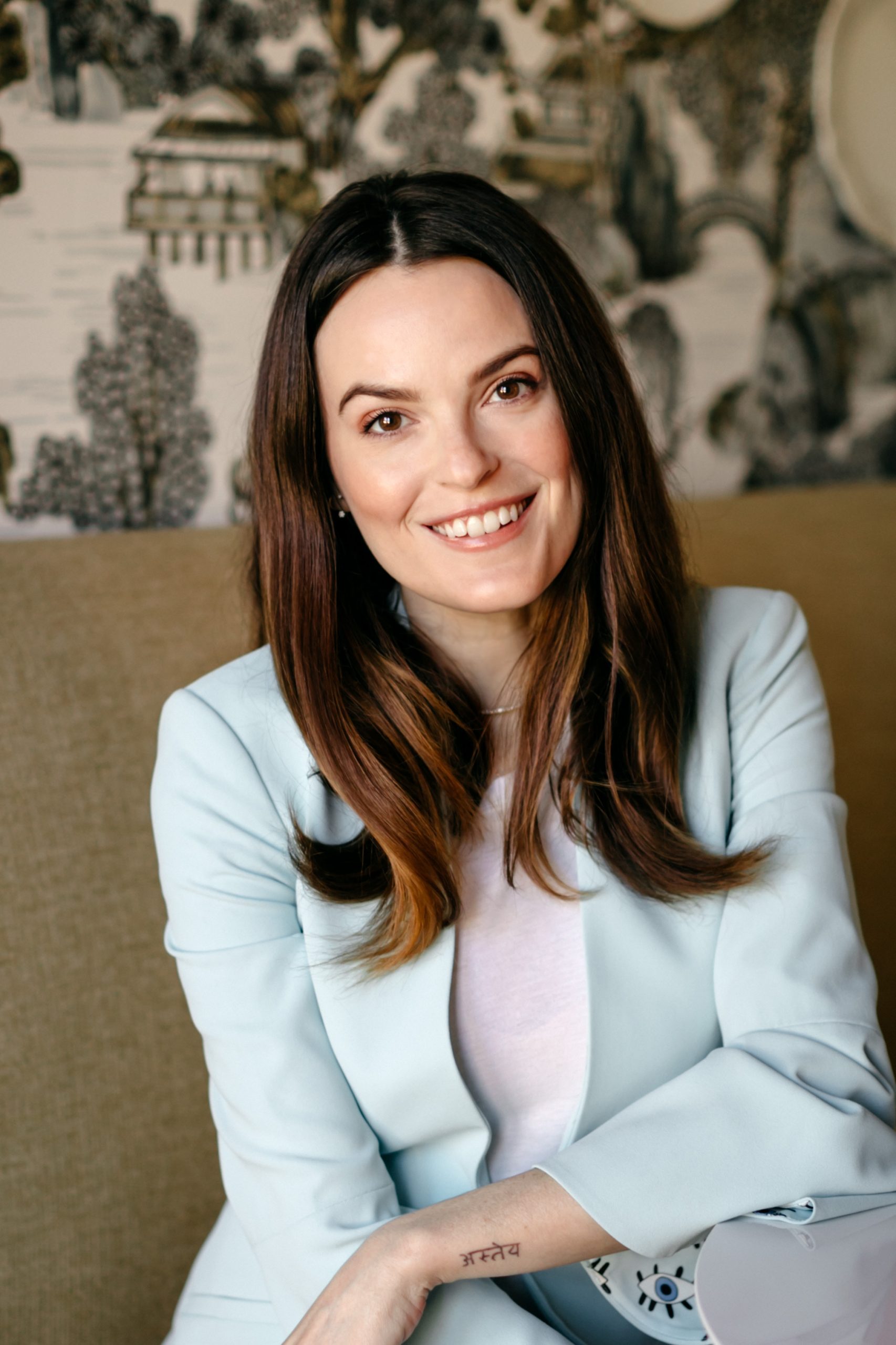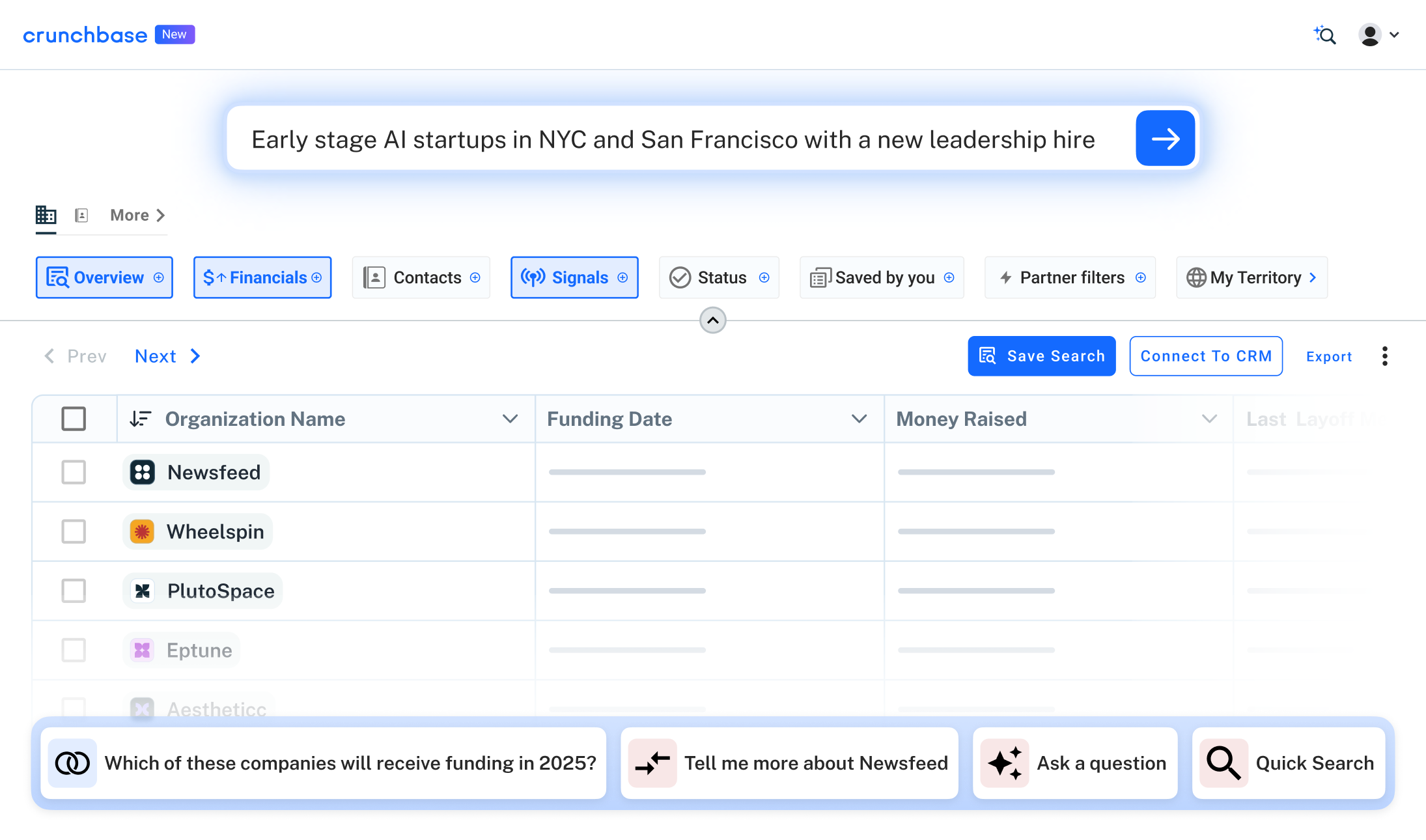This article is part of the Crunchbase Community Contributor Series. The author is an expert in their field and a Crunchbase user. We are honored to feature and promote their contribution on the Crunchbase blog.
Please note that the author is not employed by Crunchbase and the opinions expressed in this article do not necessarily reflect official views or opinions of Crunchbase, Inc.
The Crunchbase “Female Founder Series,” is a series of stories, Q&As, and thought-leadership pieces from glass-ceiling-smashers who overcame the odds and are now leading successful companies.
Alex Williamson is the co-founder and CEO of Asteya, an income insurance startup with a mission to provide financial health and well-being by transforming the disability insurance space. The importance — and necessity — of having income protection is personal for her.
She previously served as the chief brand officer at Bumble, where she was at the forefront of empowered dating, as her work at Bumble broke through social norms by encouraging women to make the first move. Near the end of her tenure at Bumble, Williamson had to take medical leave because of a debilitating fibromyalgia flare-up.
Inspired by her personal experience with a chronic health condition, Williamson is passionate about making income insurance accessible for everyone — not just the 1%. With the pandemic fundamentally changing how we think about our health and our work, she believes that now, more than ever, income protection is crucial to a person’s overall well-being.
In this Q&A, Williamson shares the story of why she pivoted from dating apps to insurance, how COVID-19 has impacted her company, and her advice for other female founders.

Q: Did you always know you wanted to be an entrepreneur?
I didn’t know that I was going to be an entrepreneur until I felt called to this work. From my time at Bumble to now, I’ve been able to see how for-profit businesses can have a positive impact on society, so I’m inspired to build companies that do good for people.
I’ve always been personally passionate about wellness and helping people. I was motivated to help the 110 million working adults who don’t have income insurance, and it just became clear that building Asteya was the way to do that. Only 51 percent of employers offer income insurance or disability insurance to their employees, meaning 49 percent of the workforce doesn’t have access. We founded Asteya to fill that gap and make income insurance more accessible for all.
Q: What were you doing before building Asteya?
I was the chief brand officer at Bumble. I was there from Day One — before it was even an app — when we were trying to change how people think about dating platforms. The challenge was to get people to think that being on dating apps was normal and cool when nobody really wanted to be associated with them. It’s amazing to reflect on how the world has changed since then.
While the transition from dating apps to income insurance may seem out of the blue, it felt natural for me because I have always been driven by work that empowers people and changes lives for the better, something that Bumble and Asteya have in common.
Q: What inspired you to start your company?
I’ve lived with fibromyalgia for over a decade. Like many others who have chronic health conditions, it bothered me mildly until it became unbearable. As CBO at Bumble, my job took me across the country and around the world. I was often living out of my suitcase, flying multiple times a week for hours at a time. But toward the end of my time at Bumble, my fibromyalgia had a debilitating flare-up, which really just made it impossible for me to keep on going at the same pace. I took medical leave, and it took months to get to the point where I wasn’t in constant pain. I ended up combining the solutions Western medicine had with study at an ashram, where I was able to reconnect with my body and find a holistic, Eastern-medicine approach for managing my pain.
My own experience with fibromyalgia inspired me to find a way to provide more people with opportunities to heal and the time to take care of their health. I am grateful that Bumble gave me the time to heal, but I realized that was an enormous privilege; one that I had previously taken for granted. That insight brought me to start Asteya.
Q: What issues did you see in the insurance space before you started Asteya?
There’s too little focus on income protection in the insurance space. Disability insurance first came about in the 1950s with benefits for disabled insured workers from the ages of 50 to 65. But not much has changed with disability insurance since then. The way we work today has been transformed by trends like the thriving gig economy as well as the popularity and possibility of remote work, but disability insurance hasn’t changed with it. Freelancers and gig economy workers need access to the disability insurance space, and that’s where Asteya comes in. We’re focused on providing flexible support and plans to meet the unique needs of today’s workforce.
Disability insurance also has a branding problem. The word “disability” is really misleading, creating incorrect assumptions around what the insurance offering is. What disability insurance is, in essence, is a way to protect your income should things go wrong. If you aren’t able to work, you need something that covers your income so that you can survive, so you can pay your bills, your mortgage. The point of disability insurance is to provide you with the safety net to be able to manage all the things that are necessary in your life in order to heal and take care of yourself. That’s why we’re redefining it as income insurance, to make clear the positive protection that it can provide.
Q: In what ways do you think differently about your industry than others do?
As someone with a chronic health condition, I have a nuanced outlook on the income insurance industry. My firsthand experience taking time for medical leave taught me the value of income protection. If Bumble had not been so generous, I would have needed disability insurance.
And being a woman, I am tuned in to the fact that women are often unfairly disadvantaged (given women statistically claim more) in insurance products — on average, women pay 40 percent more than men. I believe that being a woman should not be a preexisting condition for income insurance, and I’m working to actively address the inequality that’s ingrained in the system today by finding ways to add richer benefits and strategic changes to bring down the cost for women.
Q: How have you integrated your values and mission into your own company structure?
The value of wellness has been a long-held belief of mine. I believe that wellness and income are intertwined, so we’ve worked that into Asteya’s foundation. We’ve developed insurance products aimed at supporting people’s mental, physical and financial well-being.
The word “Asteya” comes from my time studying Eastern philosophies in the ashram. It means not taking more than you need from the earth, from others, or from yourself. Living by the value Asteya encourages a circle of abundance, and is why we decided we want to lead our company from the top down.
Q: How has the pandemic changed your business?
The past year has revealed how unforeseen circumstances can damage a person’s income and overall health. So many people are unable to work because they are suffering from the short- and long-term effects of this debilitating — and too often deadly — disease. So many people have lost their jobs during the pandemic, turning to the gig economy or running their own businesses so that they can support their families. The world has woken up to this acute need for income protection for millions of people.
Q: Do you have a favorite quote or “personal mantra” you use to keep yourself motivated?
Asteya is not just the name of our company, it’s also my personal mantra. I even have an “Asteya” tattoo to remind myself to be generous with others and with myself. It’s important to remember to not expect more of ourselves than we are able to give, especially during hard times like these.
Q: What challenge are you most proud of overcoming in your career?
One of the hardest moments of my life was when I was finally honest with myself about the fact that I was having a terrible fibromyalgia flare-up. As someone who liked to go 100 mph, and always wanted to seem completely reliable and unbreakable, it was hard to admit that I wasn’t OK, and that I needed help. It was a huge blow to my own ego. The frustrating part about invisible illnesses is that no one can see them, so it feels like you’re living with a secret that feels like a weakness to have to share. But because the condition is fairly misunderstood, it’s often underdiagnosed. There’s been a big shift in public perception over the last 10 years — more people today have heard of the condition — but getting over the stigma and instead listening to my body is probably why I am here doing what I’m doing today. Getting back to my status quo was one of the hardest things I’ve had to do during my career, and it’s made me a more empathetic and balanced leader.
Q: What is your advice for other female founders at the beginning of their entrepreneurial journeys?
Take big opportunities when they come your way if you believe in the mission. You never know exactly where they’ll lead you, but if you believe in what you’re building and disrupting, you’ll at least know that you’ve made an impact.
The other advice I would give women is to believe in yourself enough to have your own back. Too often we women bend or make concessions to be agreeable or liked — which often is seen as the way to maintain our positions in companies. As women we often have to remind ourselves that we are smarter and more capable than we think we are.
.svg)



.png)
.png)
